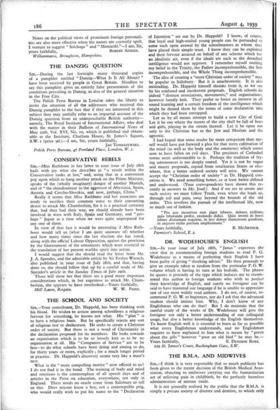THE SCHOOL AND SOCIETY
SIR,—Your contributor, Dr. Happold, has been thinking with his blood. He wishes to arouse among schoolboys a religious fervour for something, he knows not what. His " plan " is to have a religious basis. But he specifically rejects any sort of religious test or declaration. He seeks to create a Christian order of society. But there is not a word of Christianity in the declaration proposed for its members. He looks towards an organisation which is to be so loosely knit as to be no organisation at all. His " Companies of Service " are to be free—to do what schools have been doing and aiming to do, for thirty years or more, explicitly ; for a much longer period in practice. Dr. Happold's discovery seems very like a mare's nest.
What is the " more compelling motive " now offered to us? I do not find it in the bond. The training of body and mind and emotions is the commonplace of all speech days and of articles in the Press on education, everywhere, not only M England. There needs no oracle come from Salisbury to tell us this. Does anyone know a boy, not a contemptible prig, who would really wish to put his name to the " Declaration of Intention " set out by Dr. Happold? I know, of course, that loyal and high-souled young people can be persuaded to some such open avowal by the schoolmasters in whom they have placed their simple trust. I know they can be exploited and their fervour aroused on behalf of any scheme which has an idealistic air, even if the ideals are such as the detached intelligence would not approve. I remember myself reciting my belief in the Trinity, the Father incomprehensible, the Son incomprehensible, and the Whole Thing incomprehensible.
The idea of creating a "more Christian order of society " may be popular in Salisbury. But it is anachronistic. It is also misleading. Dr. Happold himself shrinks from it, as we see by his confused and incoherent proposals. English schools do indeed " distrust associations, movements," and organisations, however loosely knit. They prefer to foster an interest in all sound learning and a certain freedom of the intelligence which might be denied them by the terms of some declaration into which they had been entrapped.
Let us by all means attempt to build a new City of God. Let it be one where the streets of the city shall be full of boys and girls, playing in the streets thereof. Let it be open not only to the Christian but to the Jew and Moslem and the
agnostic.
I had hoped that some reader far more competent than my- self would have put forward a plea for that stern cultivation of the mind (as well as the body and the emotions) which seems now to have fallen on evil days. The precincts of Cathedral towns seem unfavourable to it. Perhaps the tradition of fry- ing astronomers is too deeply rooted. Yet it is not by vague and muzzy proposals, copied from totalitarian States or else- where, that a better ordered society will arise. We cannot accept the " Christian order of society " as Dr. Happold con- ceives it. We need something better, or at least better defined and understood. (Your correspondents have shown this re- cently in answers to Mr. Joad.) And if we are to create any such society we must follow Truth, even when she leads us, through toil and pain, away beyond the bounds of the old order. This involves the pursuit of the intellectual life, now so much out of fashion.
" Pro qua incurrisse non piget labores, dolores exilium; quia laborando profui, exulando didici. Quia inveni in brevi labore diuturnam requiem, in levi dolore immensum gaudium, in angusto exilio patriam amplissimam."
Parmiter's School, E. 2.








































 Previous page
Previous page